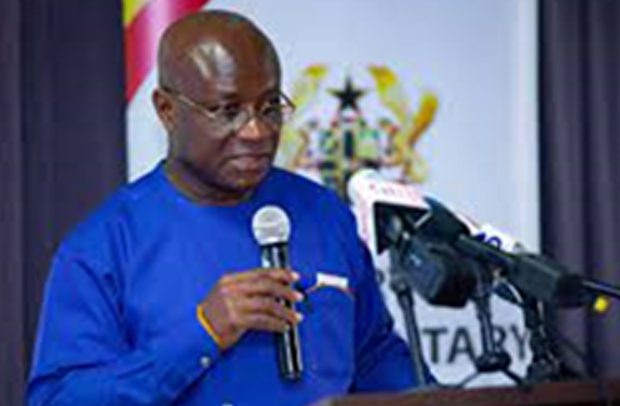
The New Patriotic Party (NPP) has officially launched its 2024 manifesto in a highly anticipated event that outlined the party's vision and plans for the next four years.
The event was attended by party members, supporters, and key stakeholders, with Vice President Dr Mahamudu Bawumia who doubles as the flagbearer and other senior party leaders presenting the core policies and initiatives that the NPP intends to pursue if re-elected.
The NPP's 2024 manifesto presents an ambitious agenda aimed at addressing the economic, social, and environmental challenges facing Ghana.
Dr Bawumia mentioned in his speech on economic transformation and job creation as well as the abolition of E-levy and the betting tax.
Here are the 15 key highlights from the NPP's 2024 manifesto launch:
1. Economic transformation and job creation:
The NPP reiterated its commitment to transforming Ghana's economy by focusing on industrialisation, digitalisation, and entrepreneurship.
The party promised to create one million jobs over the next four years, with special emphasis on youth employment through initiatives like YouStart and 1D1F (One District, One Factory).
2. Abolition of E-levy and betting tax:
In a move aimed at reducing the financial burden on Ghanaians, the NPP pledged to abolish the controversial E-Levy and the betting tax.
This proposal was met with cheers from supporters, especially the youth, who have been vocal about the negative impact of these taxes.
3. National credit scoring system:
The manifesto introduced the idea of a national credit scoring system designed to improve access to credit for Ghanaians.
This system will allow citizens to obtain loans more easily, fostering financial inclusion and supporting personal and business growth under the slogan buy now, pay small small.
4. Infrastructure development:
The NPP committed to continuing its focus on infrastructure development, including expanding road networks, building more schools, and upgrading healthcare facilities.
The party highlighted plans for a new railway line to enhance connectivity between key economic zones.
5. Health sector reforms:
The manifesto outlined comprehensive reforms in the health sector, including the expansion of the National Health Insurance Scheme (NHIS) to cover more treatments and the introduction of a nationwide telemedicine program to improve healthcare access in remote areas.
The NPP will complete all Agenda 111 hospitals. This ensures every District
gets a District Hospital to recruit more doctors, nurses, and other healthcare professionals, with improved conditions of service to bring healthcare services to your doorstep by:

a. completing the digitisation of public healthcare institutions under the E-health Project
b. scaling up telehealth services
c. establishing two additional sites, in addition to the existing at Funsi and Kintampo, to enhance drone delivery services and to ensure total nationwide coverage, and
d. ensuring the interoperability of the National Electronic Pharmacy Platform (NEPP) with public and private healthcare facilities
offer incentives for healthcare workers to buy one vehicle each with an engine capacity of up to 1,800cc, and ensure compliance with the existing deprived area incentive package for health workers.
6. Education and skills training:
The NPP emphasised its commitment to education, promising to build more schools and expand access to free Senior High School (SHS) education.
The manifesto also included plans to strengthen Technical and Vocational Education and Training (TVET) to equip the youth with practical skills for the job market.
7. Agricultural modernisation:
Agriculture remains a priority for the NPP, with plans to modernise the sector through increased mechanisation, improved access to inputs like fertilisers, and enhanced support for farmers.
The manifesto also promised to expand the Planting for Food and Jobs program to ensure food security and boost exports.
8. Anti-corruption measures:
In its manifesto, the NPP reiterated its commitment to fighting corruption and promoting transparency in government. The party plans to strengthen anti-corruption institutions and enforce stricter penalties for corrupt practices.
The party also vowed to implement stricter measures to curb illegal mining (galamsey) and protect the environment.
9. Digitisation and innovation:
Building on its achievements in digitalisation, the NPP promised to further digitise government services to improve efficiency and reduce bureaucracy.
The manifesto included plans for expanding the National Identification System (Ghana Card) and integrating it with other services like health, education, and banking.
10. Energy and environmental sustainability:
The NPP's manifesto focused on energy sustainability, with promises to increase the use of renewable energy sources, improve energy efficiency, and ensure a reliable supply of electricity.

The party also highlighted its commitment to environmental conservation, including reforestation initiatives and stricter enforcement of environmental regulations.
11. Housing and urban development
The party has pledged to address the housing deficit by increasing the construction of affordable housing units. Additionally, urban development plans will focus on improving sanitation, water supply, and public transport in cities.
12. Empowerment of women and gender equality
The NPP's manifesto emphasises the empowerment of women through increased access to education, healthcare, and economic opportunities.
The party also promised to strengthen policies aimed at achieving gender equality in all sectors of society and implement in full the Affirmative Action Act recently enacted.
The NPP will also establish a Women's Trade Empowerment Fund (WoTEF) to support women-owned businesses, ensure gender parity in the award of government scholarships, further improve the maternal health care programme, pursue a Women in Diplomacy programme for Ghanaian women to take more leadership roles in international organisations, and promote and protect women's rights in the workplace by:
a. ensuring that existing sexual harassment laws are strictly enforced
b. enabling mothers to seamlessly re-enter the workforce by prioritising, in partnership with the private sector, the establishment of daycare centres near workplaces, including marketplaces, and
c. enforcing existing regulations on maternity leave governance.
13. National security and public safety
Ensuring the safety and security of citizens remains a top priority. The NPP's manifesto outlines plans to enhance the capabilities of the security forces, improve border control, and address emerging security threats.
14. Promoting tourism and culture
The NPP aims to boost Ghana's tourism sector by promoting the country's rich cultural heritage and natural attractions. The manifesto includes initiatives to develop tourism infrastructure and attract more international visitors.
The party will create other jobs through tourism, creative arts and sports; the Jobs Abroad programme; Youth in Seafaring programme; aviation and logistics; and Green energy industries, including EVs.
The NPP intends to use tax incentives, including a flat tax, to incentivise the private sector, investments in sports, tourism, and creative arts facilities, implement an e-visa policy for all international visitors to Ghana, and make visa acquisition fast and convenient for visitors.
The manifesto will roll out a visa-free policy for all nationals of African and Caribbean countries visiting Ghana, and establish in partnership with the private sector, a streaming and digital management platform for Ghanaian content developers in the creative arts.
It will also establish a Travel Protocol Service (TPS) for the creatives and community to enable artists, performers, and other creatives, to honour international performances and shows.
15. Environmental sustainability
Recognising the importance of environmental conservation, the NPP's manifesto includes commitments to protect Ghana's natural resources, enhance the protection of our forests and biodiversity hotspots, restore the forests through reforestation programmes by:
a. targeting 30,000ha of degraded areas for reforestation and plantation development annually
b. establishing 1,000 ha of bamboo and rattan plantations annually for watershed protection and plantation development, and
c. Provide tree seedlings and plantain suckers in a minimum of 1000 communities to enhance the national reforestation and plantation development programme.



















Facebook
Twitter
Pinterest
Instagram
Google+
YouTube
LinkedIn
RSS